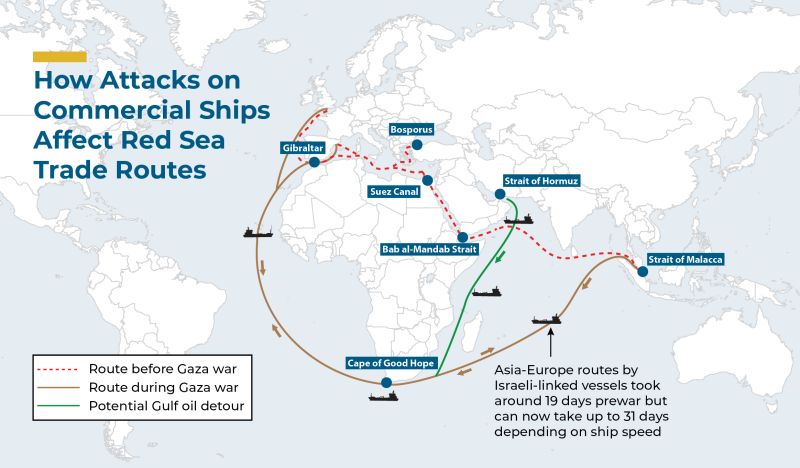In February, India experienced a significant recovery in its fuel exports to Europe, with shipments rebounding sharply. This resurgence in exports signifies a positive development for India’s economy, particularly in the energy sector, as it indicates a revival in demand and economic activity both domestically and internationally.
One noteworthy aspect of this recovery is the shift in the shipping routes taken by bulk fuel carriers. Traditionally, vessels transporting fuel from India to Europe would traverse the Suez Canal, a vital waterway connecting the Mediterranean Sea to the Red Sea, thus providing a shorter and more direct route. However, due to geopolitical tensions and security concerns in the Suez Canal region, many vessels have opted for a longer route around the southern tip of Africa, known as the Cape of Good Hope.

SOURCE:- LinkedIn
This decision to take the longer route reflects the challenges and risks associated with navigating through the Suez Canal, which has been a focal point of international attention following recent events, including the blockage caused by the Ever Given container ship in March 2021. While the Suez Canal offers a shorter transit time and reduced fuel costs, concerns about security and disruptions have prompted shipping companies to reconsider their routes.
SOURCE:- BBC NEWs
By opting for the longer route around Africa, vessels carrying fuel from India to Europe can mitigate the risks associated with the Suez Canal while ensuring the safe and timely delivery of their cargo. Although this route may entail higher fuel costs and longer transit times, it provides a viable alternative for shipping companies seeking to avoid potential delays and disruptions.
The recovery in India’s fuel exports to Europe is indicative of the resilience and adaptability of the country’s energy sector in responding to evolving market dynamics and geopolitical challenges. Despite the uncertainties surrounding global trade and transportation routes, India has demonstrated its ability to maintain its position as a key supplier of fuel to European markets.
Looking ahead, it will be essential for India to continue monitoring developments in global shipping routes and geopolitical hotspots to effectively manage its fuel exports and ensure the uninterrupted flow of trade. Additionally, efforts to enhance the efficiency and security of maritime transportation, including investments in infrastructure and technology, will be crucial for sustaining India’s competitiveness in the global energy market.
Overall, the sharp recovery in India’s fuel exports to Europe in February underscores the resilience of the country’s energy sector and highlights the importance of proactive measures to mitigate risks and capitalize on emerging opportunities in the international market.
Share your views In the comments

